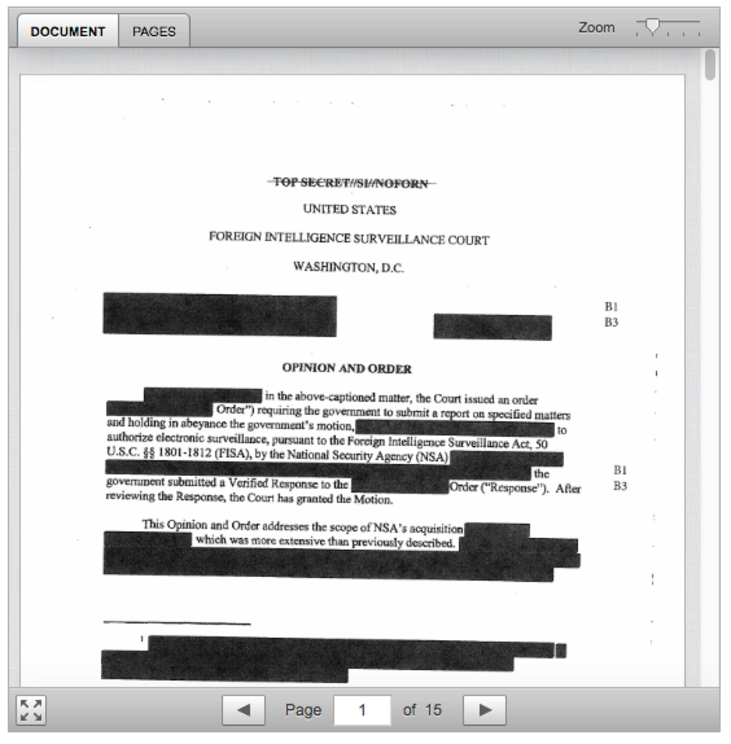NSA frequently abuses Its collection powers
... another batch of FISA court docs confirms
from the violating-the-law-on-the-regular dept
More evidence of the NSA's abuse of its surveillance powers has surfaced, thanks to a FOIA lawsuit by the EFF. To date, the EFF has secured 73 FISC opinions as the result of this lawsuit and is still fighting for the release of six opinions the government has chosen to withhold entirely.
One of the opinions released to the EFF shows the NSA's frequent assertions about proper minimization, careful deployment of surveillance techniques, and supposedly robust oversight are mostly false. The NSA abuses its powers and withholds evidence of its abuses from the FISA court, undermining the system of checks and balances meant to keep the agency in line.
The opinion [PDF] embedded below is just one of several recently acquired by the EFF, but it still shows plenty of surveillance power abuse by the agency. Aaron Mackey of the EFF summarizes the contents of the order:
The opinion, the date of which is redacted, orders the deletion of materials the NSA collected without court authorization. The opinion recounts how after the court learned that the NSA had exceeded an earlier issued surveillance order—resulting in surveillance it was not authorized to conduct—the government argued that it had not actually engaged in unauthorized surveillance. Instead, the government argued that it had only violated “minimization procedures,” which are restrictions on the use of the material, not the collection of it.
Judge Hogan, who served on the FISC from 2009-16 and was its chief judge from 2014-16, expressed frustration both with the government’s argument and with its lack of candor, as the court believed officials had previously acknowledged that the surveillance was unauthorized. The opinion then describes how the surveillance failed to comply with several provisions of the Foreign Intelligence Surveillance Act (FISA) in collecting the intelligence.
Much of the opinion is redacted, leaving only sentence fragments for readers to parse. But even these fragments manage to produce a decent depiction of apparently long-running program abuses by the NSA. What the court called "unauthorized electronic surveillance," the government claimed was only a violation of minimization procedures. Even if the court was willing to cede this argument to the government (and it wasn't), the court goes on to point out that the NSA had done nothing to address this violation of minimization procedures.
The government has undertaken, but not completed, a process to identify and destroy [redacted], such that the effects of having acquired [redacted] have not been completely eradicated.
A little further on, the court makes it clear repairing minimization procedures does not excuse prior unauthorized collections, nor would it make similar collections legal in the future.
It has been understood from the inception of FISA that minimization procedures could include limitations on what communications may be acquired from surveillance directed at an otherwise authorized facility. When the government disregards such a limitation, thereby acquiring communications in excess of what the order authorizes, those acquisitions constitute unauthorized electronic surveillance…
And it appears the NSA again withheld info from the court, preventing it from doing its job properly.
[T]he Court was deprived of an adequate understanding of the facts known to NSA and, even if the government were correct that acquisition [redacted] was authorized, a clear and express record of that authorization is lacking.
This is only one of several FISA court documents discussing unauthorized collections. The stockpile of FOIAed documents indicates the government has rarely used its collections programs correctly. The history of the NSA's interactions with the FISA court is littered with references to over-collection and agency obfuscation. This is more of the same from an agency that claims to be precisely and thoroughly controlled by external and internal oversight. The FISA court documents don't align with the NSA's narrative. Instead, they show an agency willing to ignore the law and mislead the court to engage in surveillance its oversight has never authorized.

Documents can be viewed at source link below.

